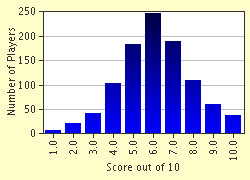Quiz Answer Key and Fun Facts
1. The study of the sounds of language is known as:
2. Which of the following words can be described as containing an affricate?
3. The study of the structure of words is known as:
4. This early anthropologist is considered to be one of the giants of modern linguistics...who was it?
5. Spoken language is believed to have arisen in what early human group?
6. Ferdinand de Saussure made a distinction between speech and language. In his words, how did he label these two categories?
7. Fricatives are formed by:
8. True or False : Sounds can be voiced or voiceless.
9. Noam Chomsky believes that there is a(n):
10. One who studies language can be considered a(n):
Source: Author
Leki
This quiz was reviewed by FunTrivia editor
nerthus before going online.
Any errors found in FunTrivia content are routinely corrected through our feedback system.


